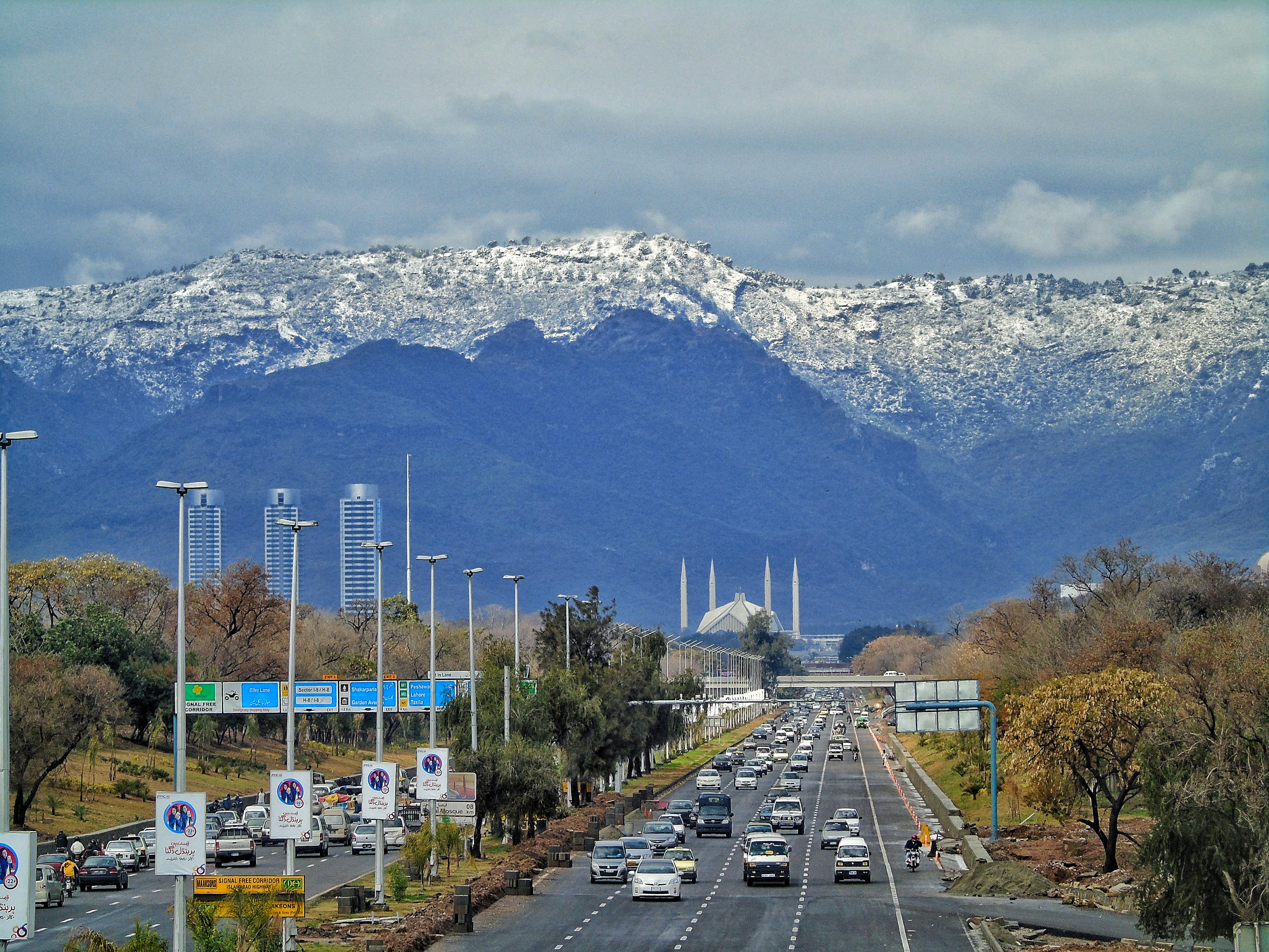|
Malik Iftikhar Ahmed
Malik Iftikhar Ahmed is a Pakistani politician who was a Member of the Provincial Assembly of the Punjab, from 2008 to May 2018. Early life and education He was born on 15 May 1972 in Islamabad. He has completed intermediate level education. Political career He was elected to the Provincial Assembly of the Punjab as a candidate of Pakistan Muslim League (N) (PML-N) from Constituency PP-10 (Rawalpindi-X) in a by-poll held in August 2008. He received 18,322 votes and defeated an independent candidate, Malik Mehboob Elahi. He was elected to the Provincial Assembly of the Punjab as a candidate of PML-N from Constituency PP-10 (Rawalpindi-X) in 2013 Pakistani general election. He received 42,539 votes and defeated Umer Tanveer, a candidate of Pakistan Tehreek-e-Insaf The Pakistan Tehreek-e-Insaf (PTI; ur, , ) is a political party in Pakistan. It was founded in 1996 by Pakistani cricketer-turned-politician Imran Khan, who served as the country's prime minister from 2018 to ... [...More Info...] [...Related Items...] OR: [Wikipedia] [Google] [Baidu] |
Provincial Assembly Of The Punjab
The Provincial Assembly of the Punjab is a unicameral legislature of elected representatives of the Pakistani province of Punjab, which is located in Lahore, the provincial capital. It was established under Article 106 of the Constitution of Pakistan, having a total of 371 seats, with 297 general seats, 66 seats reserved for women and 8 reserved for non-Muslims. Site history The 2-story Assembly Chamber, residential hostels, and expansive lawns cover on the Shahrah-e-Quaid-Azam (the Mall). After it was completed in 1935, the Assembly Chamber housed the Assembly for the Punjab province. After the division of Punjab and the emergence of Pakistan, the building became the administrative center of Pakistani Punjab. Assembly Chamber Designed by Bazel M. Salune, chief architect of the Architecture Circle of Punjab, the foundation stone of the Assembly Chamber was laid by Sir Jogindar Singh, Minister of Agriculture, in November 1935 during the British Raj. The first floor houses the ... [...More Info...] [...Related Items...] OR: [Wikipedia] [Google] [Baidu] |
Islamabad
Islamabad (; ur, , ) is the capital city of Pakistan. It is the country's ninth-most populous city, with a population of over 1.2 million people, and is federally administered by the Pakistani government as part of the Islamabad Capital Territory. Built as a planned city in the 1960s, it replaced Rawalpindi as Pakistan's national capital. The city is notable for its high standards of living, safety, cleanliness, and abundant greenery. Greek architect Constantinos Apostolou Doxiadis developed Islamabad's master plan, in which he divided it into eight zones; administrative, diplomatic enclave, residential areas, educational and industrial sectors, commercial areas, as well as rural and green areas administered by the Islamabad Metropolitan Corporation with support from the Capital Development Authority. Islamabad is known for the presence of several parks and forests, including the Margalla Hills National Park and the Shakarparian. It is home to several landmarks, i ... [...More Info...] [...Related Items...] OR: [Wikipedia] [Google] [Baidu] |
Pakistan Muslim League (N)
The Pakistan Muslim League (Nawaz) ( ur, , translit=Pākistān Muslim Līg (Nūn) PML(N) or PML-N) is a centre-right and liberal conservative political party in Pakistan. Alongside the Pakistan Tehreek-e-Insaf (PTI) and Pakistan Peoples Party (PPP), it is one of the three major political parties of the country. The party was founded by former Prime Minister Nawaz Sharif after the dissolution of Islamic Democratic Alliance in 1993. The party's platform is generally conservative, which involves supporting free markets, deregulation, lower taxes and private ownership. Although the party historically supported social conservatism, in recent years, the party’s political ideology and platform has become more liberal on social and cultural issues. One of several continuing factions of the original Muslim League, the seeds of the party were sown following the 1985 Elections when the Prime Minister of Pakistan Muhammad Khan Junejo organised the supporters of President ... [...More Info...] [...Related Items...] OR: [Wikipedia] [Google] [Baidu] |
Malik Ibrar Ahmed
Malik Ibrar Ahmed (; born 3 January 1970) is a Pakistani politician who had been a member of the National Assembly of Pakistan, from 2008 to May 2018. Previously, he has been a member of the Provincial Assembly of the Punjab from 2002 to 2007 . Early life and education He was born on 3 January 1970 in Rawalpindi. He earned a Bachelor of Arts degree from Government College Asghar Mall Rawalpindi in 1992. Political career He was elected to the Provincial Assembly of the Punjab as a candidate of Pakistan Muslim League (N) (PML-N) from Constituency PP-10 (Rawalpindi-X) in 2002 Pakistani general election. He received 17,035 votes and defeated a candidate of Pakistan Peoples Party (PPP). He was elected to the National Assembly of Pakistan as a candidate of PML-N from Constituency NA-54 (Rawalpindi-V) in 2008 Pakistani general election. He received 58,228 votes and defeated a candidate of PPP. In the same election, he was re-elected to the Provincial Assembly of the Punjab as a ... [...More Info...] [...Related Items...] OR: [Wikipedia] [Google] [Baidu] |
2013 Pakistani General Election
General elections were held in Pakistan on Saturday 11 May 2013 to elect the members of the 14th National Assembly and the four Provincial Assemblies. The three major parties were the Pakistan Muslim League (N) (PML-N) led by Nawaz Sharif, the Pakistan People's Party (PPP) led by President Asif Ali Zardari and the Pakistan Tehreek-e-Insaf (PTI) led by Imran Khan. Prior to the elections, the ruling PPP formed an alliance with the Pakistan Muslim League (Q) and Awami National Party, while the main opposition party, the PML-N allied with the Pakistan Muslim League (F) and Baloch parties. The PTI led by cricketer-turned-politician Imran Khan, also emerged as a key-player. The result was a hung parliament, with the PML-N receiving the most votes and winning the most seats, but falling six seats short of a majority. However, following the elections, 19 independent MPs joined the PML-N, allowing it to form a government alone with Nawaz Sharif as new Prime Minister. In the ... [...More Info...] [...Related Items...] OR: [Wikipedia] [Google] [Baidu] |
Pakistan Tehreek-e-Insaf
The Pakistan Tehreek-e-Insaf (PTI; ur, , ) is a political party in Pakistan. It was founded in 1996 by Pakistani cricketer-turned-politician Imran Khan, who served as the country's prime minister from 2018 to 2022. The PTI is one of the three major Pakistani political parties alongside the Pakistan Muslim League–Nawaz (PML–N) and the Pakistan People's Party (PPP), and it is the largest party in terms of representation in the National Assembly of Pakistan since the 2018 general election. With over 10 million members in Pakistan and abroad, it claims to be the country's largest political party by primary membership as well as one of the largest political parties in the world. Despite Khan's popular persona in Pakistan, the PTI had limited initial success: it failed to win, as a collective, a single seat in the 1997 general election and the 2002 general election; only Khan himself was able to win a seat. Throughout the 2000s, the PTI remained in opposition to the pre ... [...More Info...] [...Related Items...] OR: [Wikipedia] [Google] [Baidu] |
Living People
Related categories * :Year of birth missing (living people) / :Year of birth unknown * :Date of birth missing (living people) / :Date of birth unknown * :Place of birth missing (living people) / :Place of birth unknown * :Year of death missing / :Year of death unknown * :Date of death missing / :Date of death unknown * :Place of death missing / :Place of death unknown * :Missing middle or first names See also * :Dead people * :Template:L, which generates this category or death years, and birth year and sort keys. : {{DEFAULTSORT:Living people 21st-century people People by status ... [...More Info...] [...Related Items...] OR: [Wikipedia] [Google] [Baidu] |
Punjab MPAs 2013–2018
Punjab (; Punjabi: پنجاب ; ਪੰਜਾਬ ; ; also romanised as ''Panjāb'' or ''Panj-Āb'') is a geopolitical, cultural, and historical region in South Asia, specifically in the northern part of the Indian subcontinent, comprising areas of eastern Pakistan and northwestern India. Punjab's capital and largest city and historical and cultural centre is Lahore. The other major cities include Faisalabad, Rawalpindi, Gujranwala, Multan, Ludhiana, Amritsar, Sialkot, Chandigarh, Jalandhar, and Bahawalpur. Punjab grew out of the settlements along the five rivers, which served as an important route to the Near East as early as the ancient Indus Valley civilization, dating back to 3000 BCE, and had numerous migrations by the Indo-Aryan peoples. Agriculture has been the major economic feature of the Punjab and has therefore formed the foundation of Punjabi culture, with one's social status being determined by land ownership. The Punjab emerged as an important agricultural regi ... [...More Info...] [...Related Items...] OR: [Wikipedia] [Google] [Baidu] |
1972 Births
Within the context of Coordinated Universal Time (UTC) it was the longest year ever, as two leap seconds were added during this 366-day year, an event which has not since been repeated. (If its start and end are defined using Solar time, mean solar time [the legal time scale], its duration was 31622401.141 seconds of Terrestrial Time (or Ephemeris Time), which is slightly shorter than 1908 in science#Astronomy, 1908). Events January * January 1 – Kurt Waldheim becomes Secretary-General of the United Nations. * January 4 - The first scientific hand-held calculator (HP-35) is introduced (price $395). * January 7 – Iberia Airlines Flight 602 crashes into a 462-meter peak on the island of Ibiza; 104 are killed. * January 9 – The RMS Queen Elizabeth, RMS ''Queen Elizabeth'' is destroyed by fire in Hong Kong harbor. * January 10 – Independence leader Sheikh Mujibur Rahman returns to Bangladesh after spending over nine months in prison in Pakistan. * January 11 – Sheik ... [...More Info...] [...Related Items...] OR: [Wikipedia] [Google] [Baidu] |
Pakistan Muslim League (N) Politicians
The Pakistan Muslim League ( ur, ; known as PML), is the name of several different Pakistani political parties that have dominated the right-wing platform in the country. The Muslim League (a different party) was the party of Pakistan’s founders. But it faced multiple fractures soon after the creation of Pakistan in 1947. It vanished in the 1970s. Its revival began in the mid-1980s and today several parties in Pakistan are named Muslim League. History First phase (1962–1969) The first "Pakistan" Muslim League was founded by President Ayub Khan in 1962 as a successor to the original Muslim League. Just a short period after its foundation, the party broke into two factions: Convention Muslim League that supported the President and the new Constitution, and the Council Muslim League, that opposed the new Constitution, denouncing it as undemocratic that made the Presidency an autocratic position. Following President Ayub's resignation, Nurul Amin, a right-wing polit ... [...More Info...] [...Related Items...] OR: [Wikipedia] [Google] [Baidu] |
Punjab MPAs 2008–2013
Punjab (; Punjabi: پنجاب ; ਪੰਜਾਬ ; ; also romanised as ''Panjāb'' or ''Panj-Āb'') is a geopolitical, cultural, and historical region in South Asia, specifically in the northern part of the Indian subcontinent, comprising areas of eastern Pakistan and northwestern India. Punjab's capital and largest city and historical and cultural centre is Lahore. The other major cities include Faisalabad, Rawalpindi, Gujranwala, Multan, Ludhiana, Amritsar, Sialkot, Chandigarh, Jalandhar, and Bahawalpur. Punjab grew out of the settlements along the five rivers, which served as an important route to the Near East as early as the ancient Indus Valley civilization, dating back to 3000 BCE, and had numerous migrations by the Indo-Aryan peoples. Agriculture has been the major economic feature of the Punjab and has therefore formed the foundation of Punjabi culture, with one's social status being determined by land ownership. The Punjab emerged as an important agricultural ... [...More Info...] [...Related Items...] OR: [Wikipedia] [Google] [Baidu] |




